Digital Humanities Courses
Digital mapping, video and audio recording, multimedia podcasting, online publishing and digital analysis: these are just some of the skills that students can acquire as they explore in-depth and intensive interdisciplinary humanities seminars.
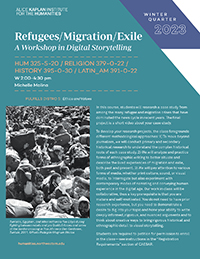 REFUGEES/MIGRATION/EXILE: A WORKSHOP IN DIGITAL STORYTELLING
REFUGEES/MIGRATION/EXILE: A WORKSHOP IN DIGITAL STORYTELLING
HUM 325-5-20 / RELIGION 379-0-22 / HISTORY 395-0-30 / LATIN_AM 391-0-22
Instructor: Michelle Molina (Religious Studies)
Winter 2025, Winter 2023
In this course, students will research a case study from among the many refugee and migration crises that have dominated the news cycle in recent years. The final project is a short video about your case study. To develop your research projects, the class foregrounds different methodological approaches: 1) To move beyond journalism, we will conduct primary and secondary historical research to understand the complex historical roots of each case study. 2) We will analyze and practice forms of ethnographic writing to better situate and describe the lived experiences of migration and exile, both past and present. 3) We will pay attention to various forms of media, whether print culture, sound, or visual media, to interrogate but also experiment with contemporary modes of narrating and conveying human experience in the digital age. Our work in class will be collaborative, thus a key prerequisite is that you are mature and self-motivated. You do not need to have prior research experience, but you need to demonstrate a desire to dig into your topic and hone your ability to write deeply informed, rigorous, and nuanced arguments and to think about creative ways to bring rigorous historical and ethnographic detail to visual storytelling.
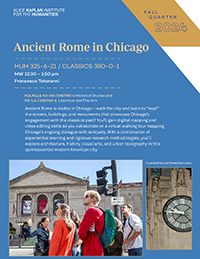 ANCIENT ROME IN CHICAGO
ANCIENT ROME IN CHICAGO
HUM 325-6 / CLASSICS 390-0
Instructor: Francesca Tataranni (Classics; Charles Deering McCormick Distinguished University Professor of Instruction Award)
Winner of an Alumnae of Northwestern Curriculum Development Award
Fall 2024, 2022, 2019, 2018, 2017, 2016, 2015; Spring 2022
- View the collaborative online map from this class: https://s3.amazonaws.com/uploads.knightlab.com/storymapjs/783a09de8300e1b5f74b99b99acb08ef/ancient-rome-in-chicago/index.html
Ancient Rome is visible in Chicago — walk the city and learn to “read” the streets, buildings, and monuments that showcase Chicago’s engagement with the classical past! You’ll gain digital mapping and video editing skills as you collaborate on a virtual walking tour mapping Chicago’s ongoing dialogue with antiquity. With a combination of experiential learning and rigorous research methodologies, you’ll explore architecture, history, visual arts, and urban topography in this quintessential modern American city.
(Additional instructional support provided by Weinberg's MAD Studio and Northwestern University Libraries: Center for Scholarly Communication & Digital Curation)
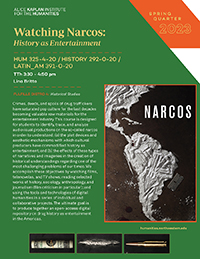 WATCHING NARCOS: HISTORY AS ENTERTAINMENT
WATCHING NARCOS: HISTORY AS ENTERTAINMENT
HUM 325-4-20 / HISTORY 292-0-20 / LATIN_AM 391-0-20
Instructor: Lina Britto (History)
Spring 2023
Crimes, deeds, and spoils of drug traffickers have saturated pop culture for the last decades becoming valuable raw materials for the entertainment industry. This course is designed for students to identify, trace, and analyze audiovisual productions on the so-called narcos in order to understand: (a) the plot devices and aesthetic mechanisms with which cultural producers have commodified history as entertainment; and (b) the effects of these types of narratives and imageries in the creation of historical understandings regarding one of the most challenging problems of our times. We accomplish these objectives by watching films, telenovelas, and TV shows; reading selected works of history, sociology, anthropology, and journalism (film criticism in particular); and using the tools and technologies of digital humanities in a series of individual and collaborative projects. The ultimate goal is to produce together an open-access digital repository on drug history as entertainment in the Americas.
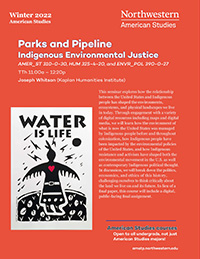 PARKS AND PIPELINE: INDIGENOUS ENVIRONMENTAL JUSTICE
PARKS AND PIPELINE: INDIGENOUS ENVIRONMENTAL JUSTICE
HUM 325-4-20 / ENVR_POL 390-0-27 / AMER_ST 310-0-30
Instructor: Joseph Whitson (Postdoctoral Fellow in Digital Humanities, Kaplan Institute and History)
Winter 2022
This seminar explores how the relationship between the United States and Indigenous people has shaped the environments, ecosystems, and physical landscapes we live in today. Through engagement with a variety of digital resources including maps and digital media, we will learn how the environment of what is now the United States was managed by Indigenous people before and throughout colonization, how Indigenous people have been impacted by the environmental policies of the United States, and how Indigenous resistance and activism have shaped both the environmental movement in the U.S. as well as contemporary Indigenous political thought. In discussion, we will break down the politics, economics, and ethics of this history, challenging ourselves to think critically about the land we live on and its future. In lieu of a final paper, this course will include a digital, public-facing final assignment.
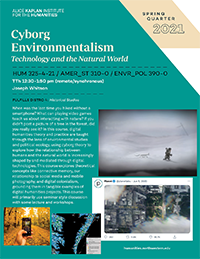 CYBORG ENVIRONMENTALISM: TECHNOLOGY AND THE NATURAL WORLD
CYBORG ENVIRONMENTALISM: TECHNOLOGY AND THE NATURAL WORLD
HUM 325-4-21 / AMER_ST 310 and ENVR_POL 390
Instructor: Joseph Whitson (Postdoctoral Fellow in Digital Humanities, Kaplan Institute and History)
Spring 2021
When was the last time you hiked without a smartphone? What can playing video games teach us about interacting with nature? If you didn’t post a picture of a tree in the forest, did you really see it? In this course, digital humanities theory and practice are taught through the lens of environmental studies and political ecology, using cyborg theory to explore how the relationship between humans and the natural world is increasingly shaped by and mediated through digital technologies. This course explores theoretical concepts like connective memory, our relationship to social media and mobile photography, and digital colonialism, grounding them in tangible examples of digital humanities projects. This course will primarily use seminar style discussion with some lecture and workshops.
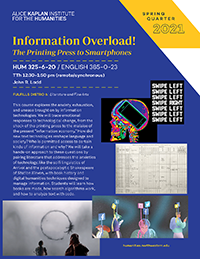 INFORMATION OVERLOAD! FROM THE PRINTING PRESS TO THE SMARTPHONE
INFORMATION OVERLOAD! FROM THE PRINTING PRESS TO THE SMARTPHONE
HUM 325-6-20 / ENGLISH 385-0-20
Instructor: John R. Ladd (Postdoctoral Fellow in Digital Humanities, Kaplan Institute)
Spring 2021 and Spring 2020
This course explores the anxiety, exhaustion, and unease brought on by information technologies. We will trace emotional responses to technological change, from the shock of the printing press to the malaise of the present "information economy." How did new text technologies reshape language and society? Who is permitted access to certain kinds of information and why? We will take a hands-on approach to these questions by pairing literature that addresses the anxieties of technology, like the scifi linguistics of Arrival and the postapocalyptic Shakespeare of Station Eleven, with book history and digital humanities techniques designed to manage information. Students will learn how books are made, how search algorithms work, and how to analyze text with code.
THE CINEMA OF ALWAYS-ON COMPUTING
HUM 325-6-21 / ENGLISH 385
Instructor: James Hodge (English and Humanities)
Fall 2020
In the 21st century, visual culture moved from the big screen to the small screen. The rise of smartphones, social media, and ubiquitous wireless networks ushered in a new way of life lived on the basis of constant connectivity. This apparent transformation in the media landscape has not only witnessed the emergence of new devices (the iPhone) and aesthetics (#oddlysatisfying), it has also shifted the role of older visual forms. This course considers the place of cinema in the age of always-on computing, and cinema’s role in documenting, representing, and expressing the technological tumult of the historical present. It analyzes the ways new technologies have affected the thematic preoccupations of filmmakers and also formal innovations and experimentations reflective of the experience of always-on computing. The course will proceed by pairing one or two movies per week with readings drawn from critical theory and cinema and digital media studies. These combinations will aim to open up discussion of the films themselves as well as broader topics such as networked personalization, Big Data, fake news, self-care, gamification, gender, and much else. Movies to be studied may include The Matrix, The Social Network, Her, Personal Shopper, Unfriended: Dark Web, Citizenfour, Eighth Grade, Summer Wars, Spider-Man: Far From Home, My Best Thing, and supercuts by Jennifer Proctor.
INTRODUCTION TO DIGITAL HUMANITIES
(Graduate seminar)
HUM 395-0-20 / ENGLISH 481
Instructor: John R. Ladd (Postdoctoral Fellow in Digital Humanities, Kaplan Institute)
Fall 2020
This graduate seminar will introduce the digital humanities (DH) as a community of practice, a growing interdisciplinary field, and a set of approaches to research and teaching. Students in this course will explore a wide range of arguments and techniques, spanning such topics as critical code studies, technology in the classroom, digital editions, text and network analysis, machine learning, and data visualization. We will mix seminar discussion with hands-on activities designed to invite students to participate in DH's expanding community and to interrogate the methods, aims, and boundaries of digital scholarship in the twenty-first century.
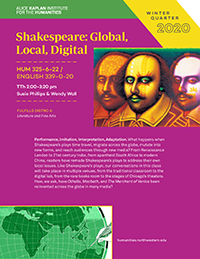 SHAKESPEARE: GLOBAL, LOCAL, DIGITAL
SHAKESPEARE: GLOBAL, LOCAL, DIGITAL
HUM 325-6-22 / ENGLISH 339-0-20
Instructors: Susie Phillips (English; The Alumnae of Northwestern University Teaching Professor) and Wendy Wall (English and Humanities; Charles Deering McCormick Professor of Teaching Excellence)
Winter 2020
Performance, Imitation, Interpretation, Adaptation. What happens when Shakespeare’s plays time travel, migrate across the globe, mutate into new forms, and reach audiences through new media? From Renaissance London to 21st century India, from apartheid South Africa to modern China, readers have remade Shakespeare’s plays to address their own local issues. In this class we will reflect on the adaptation and appropriation of Shakespeare in cultures of the world across various scales, from the local to the global, and through a range of media—from the latest digital platforms to traditional forms like print, theater, and film. Like Shakespeare’s plays, our conversations will take place in multiple venues and from multiple perspectives, from the traditional classroom to the digital media lab, from the rare books room of the Newberry Library to the stages of Chicago’s theaters. We will consider how Othello, Macbeth, and The Merchant of Venice have been continually reinvented across the globe in many media, exploring texts like Shishir Kurup’s Merchant on Venice, Toni Morrison’s Desdemona, Msomi’s uMabatha, Tayeb Salih’s Season of Migration to the North, the teen film O, and scenes from films including Throne of Blood and Tangata Whai Rawa o Weniti, Te (the Maori Merchant of Venice). Our exploration will culminate with students collaborating to build a digital curation of Shakespeare's works.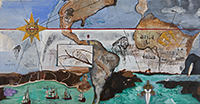 HITCHHIKING THE ATLANTIC
HITCHHIKING THE ATLANTIC
HUM 325-4 / HISTORY 392 / PORT 396
Instructor: Andrew Britt (Postdoctoral Fellow in Digital Humanities, Kaplan Institute and History)
Winter 2019
“Hitchhiking the Atlantic” charts the history of the Atlantic World through the biographies of individuals on the move. Some of these travelers were world historical figures, while others were ordinary, common people nearly forgotten to history. All of them had cross-cultural encounters and made connections that fundamentally altered their own lives and shaped historical processes much larger than themselves. We will focus on Atlantic travelers who effected and reflected historical change relating to three themes: race and American slavery, (anti)colonialism, and industrial capitalism. These themes are not isolated to the past; they continue to unfold in the present, shaping societies across the globe in the twenty-first century. Students will gain an understanding of how disparate histories in Africa, the Americas, and Europe were (and remain) interconnected on multiple scales, from individual to empire. We will examine individuals’ journeys and experiences through autobiographical source material and situate figures in broader contexts through supplementary readings. The class will produce original biographies of Atlantic World travelers and use a digital mapping application to trace their movements. No prior experience with digital mapping is necessary, and students interested in learning programming basics in a supportive and structured environment are welcome.
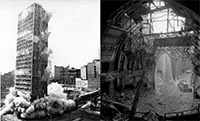 BULLDOZED: SÃO PAULO AND CHICAGO
BULLDOZED: SÃO PAULO AND CHICAGO
HUM 325-4 / HISTORY 392 / PORT 396
Instructor: Andrew Britt (Postdoctoral Fellow in Digital Humanities, Kaplan Institute and History)
Spring 2019
- View the website for this course: https://agbritt.com/teaching/bulldozed/index.html
What stories does rubble tell? This course examines the histories of São Paulo (Brazil) and Chicago (USA) through the demolitions that remade them over the twentieth century. Today among the most populous and ethnically-diverse global cities in the Americas, São Paulo and Chicago grew up as transportation gateways to the West and hubs of industry. The compelling shared and comparative histories of these two cities will serve as the basis for questions like: How do demolitions change places and the meanings attached to them? Why do authorities bulldoze certain structures and not others? Where do dislocated residents go? How have demolitions contributed to segregation, economic immobility, and racialized inequities across space and time? Course sections will follow the razing of singularly meaningful sites along with broad patterns of demolition related to housing and transportation projects (to take two examples). Source material will span from historical maps and city plans to samba and blues music that preserve razed spaces in popular memory. The course will include a collaborative research project. Students will use a digital mapping application to document, analyze, and visualize social and spatial change related to demolitions over time. No prior experience with mapping applications is required, and students interested in learning programming basics in a supportive and structured environment are welcome.The course will be taught in English, however Portuguese-language students will practice reading and communicating in Portuguese.
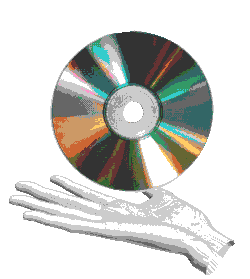 ART, WRITING, TECHNOLOGY: NEW APPROACHES TO THE DIGITAL HUMANITIES
ART, WRITING, TECHNOLOGY: NEW APPROACHES TO THE DIGITAL HUMANITIES
HUM 370-6 / ENGLISH 311-0
Instructor: Danny Snelson (Mellon Postdoctoral Fellow in Digital Humanities and English)
Spring 2017 and Spring 2016
Click for the Chalk Saroyan Instagram site from Spring 2017: https://www.instagram.com/chalksaroyan/- Click for Zornstagram from Spring 2017, collective one-word Instagram after Hollis Frampton's film Zorn's Lemma: https://www.instagram.com/zornstagram/
- In 1882, Friedrich Nietzsche used his typewriter to declare: “Our writing tools are also working on our thoughts.” How might we reconsider the history of art and literature in a time when our thoughts are being worked over by iPhones, YouTube, and Google? Can we rewrite this archive using tactics found in contemporary art and poetry? This class follows emerging trends in art and writing to construct new approaches to historical objects that are equally likely to appear on Soundcloud, in a PDF, through online videos, or even on Facebook. Studying the digital humanities alongside modes of contemporary art and letters, we’ll reimagine historical works through today’s emerging forms and formats. Through readings and class visits from artists and poets, we will explore works that translate established forms into a variety of new media formats. How might Twitter facilitate works of art? What does YouTube demand of poetry? Using a combination of seminar conversations and collaborative workshops, we’ll engage in a series of weekly experiments that attempt to reconfigure the history of art and literature through the filter of contemporary writing tools. No previous training in art, poetry, or new media is required.
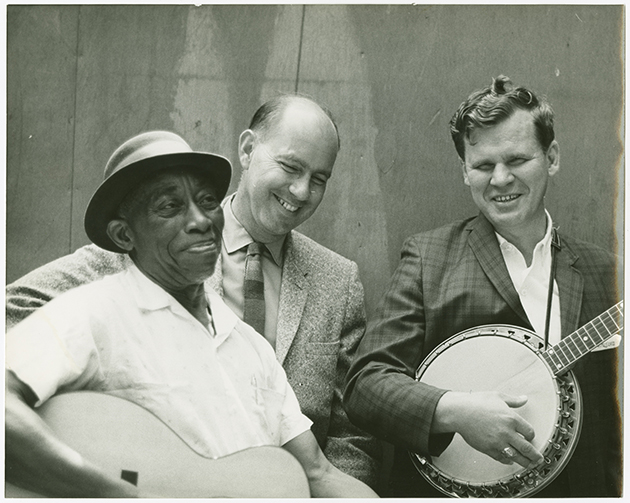 DIGITIZING FOLK MUSIC HISTORY
DIGITIZING FOLK MUSIC HISTORY
HUM 325-4 / HISTORY 395
Instructor: Michael Kramer (Visiting Assistant Professor in History)
Winner of an Alumnae of Northwestern Curriculum Development Award
Fall 2017, Winter 2017, and Winter 2016.
The United States folk music revival is typically thought of as an anti-technological movement, however to study it through digital means suggests more connections between the history of the revival and contemporary digital issues than might first meet the eye (or ear!). In this research seminar, students examine the history of the US folk music revival through readings, audio listening, documentary films, seminar discussions, and, most of all, extensive digital analysis. We probe what was at stake in the folk revival in relation to American culture and politics; questions of race, class, gender, age, and region; and the strange workings of music-making, memory, and power. As we do so, we ask how digital technologies might help us to interpret history more meaningfully; simultaneously, we explore how both the folk revival itself and the methods of historical study might be crucial to more effectively understanding our contemporary digital moment. Among other digital resources, students will use the Berkeley Folk Music Festival Collection, which is housed in Northwestern's Special Collections Library and contains a rich trove of materials about the folk revival. No previous digital or musical training is required for the course. Students will create weekly digital mini-project experiments and a final multimedia interpretive digital history podcast. (Additional instructional support provided by Weinberg's MAD Studio.)
- Read more about this course in the Spring 2014 Weinberg Magazine article (scroll down): https://www.weinberg.northwestern.edu/after-graduation/weinberg-magazine/spring-summer-2014/the-thirst-for-knowledge.html
- Read an article about Northwestern Libraries' NEH grant to digitize the folk music archive that students in this class helped digitize and curate, and also used to create digital projects: https://news.northwestern.edu/stories/2021/september/explore-the-1960s-berkeley-folk-music-festival-through-the-libraries-new-exhibit/
 TECHNOLOGIES OF LANGUAGE
TECHNOLOGIES OF LANGUAGE
HUM 325-5
Instructor: Jules Law (English; Charles Deering McCormick Professor of Teaching Excellence)
Winter 2017
- Click for the Technologies of Language website: https://sites.northwestern.edu/tol/
What if language were the true measuring stick of the world? What if the deep structure of the world itself were linguistic? What if syntax were the true nature of time? Grammar the underlying structure of logic? Our ideas of body and soul simply mirrors of the distinction between literal and metaphoric meaning? In this course we will survey some of the most important theories and philosophies of language from the last century, from Saussure to post-structuralism, with detours through Freud and Wittgenstein. At the heart of our inquiry will be the question of what it means to think of language as the technology that produces humans, and to think of the units of language as the units of the world. Finally, we will consider the most pressing issue facing language today: its digitization. How has the digitization of our cultural heritage changed the nature of the game? What is preserved and what is lost when an old book is “translated” to a digital archive? And are these problems and question continuous with ones that have always attended language, or are we confronting a profoundly new phenomenon here? For a final project in this class, students will each choose one book from the library’s Special Collections, and consider the technical and philosophic problems in converting that book in all its uniqueness and idiosyncrasies into a digital object (Additional instructional support provided by the Weinberg's MAD Studio and Northwestern University Libraries: Information and Learning Services)
 PRINT-ON-DEMAND POETRY: MAKING BOOKS AFTER THE INTERNET
PRINT-ON-DEMAND POETRY: MAKING BOOKS AFTER THE INTERNET
HUM 325-6 / ENGLISH 311-0
Instructor: Danny Snelson (Mellon Postdoctoral Fellow in Digital Humanities and English)
Winter 2017 and Fall 2015.
- Click for the Winter 2017 Print on Demand website: http://nupod17.tumblr.com/
When the written word overtook the Homeric epic poem, poetry became less about communicating information and more about lyric expression. Recently, digital technologies have been seen to present this same challenge to the book—like poetry, it isn’t dead, but may have lost its claim as the primary source of information. Yet due to digital Print-on-Demand (POD) platforms, it has never been easier for writers to publish (beyond Twitter and Facebook)! In this course, we will study the emergence of innovative forms of writing under the influence of digital networks, and experiment with POD in a series of collaborative and independent scholarly projects. From Seth Siegelaub’s The Xerox Book (1968) to works of POD poetry published throughout the quarter, we’ll examine poetry alongside developments in print technologies through seminar conversations, online threads and publication workshops. No previous experience with either poetry or publishing is required! All students will publish books about poetry made on the internet.
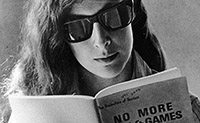 CULTURAL CRITICISM AND THE CONTEMPORARY MUSEUM
CULTURAL CRITICISM AND THE CONTEMPORARY MUSEUM
HUM 325-6 / HISTORY 393-0 / AMER_ST 310 / ART 372-0
Instructor: Michael Kramer (History)
Fall 2016
What is the history of cultural and arts criticism in the United States? Where is it headed today? This course combines historical examination with fieldwork at the Museum of Contemporary Art in Chicago. Students will read extensively in the history of cultural criticism while experimenting with new, digital modes of writing, and engage in discussion of readings, films, artworks, digital projects, performances and educational events.
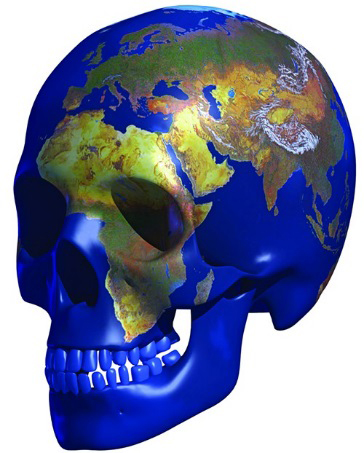 SHAKESPEARE'S CIRCUITS: GLOBAL, LOCAL, DIGITAL
SHAKESPEARE'S CIRCUITS: GLOBAL, LOCAL, DIGITAL
HUM 325-6 / ENGLISH 339
Instructors: Wendy Wall (Humanities and English; Charles Deering McCormick Professor of Teaching Excellence) and Will West (Classics and English)
Winter 2016
- Click for the Shakespeare's Circuits website: http://shakespearescircuits.northwestern.edu/
What can you do with Shakespeare’s plays? Perform them, behold them, read them, interpret them, imitate them, adapt them? Track them as they travel the globe and mutate into new forms? Shakespeare’s infinite variety—in diverse applications—has travelled everywhere: in Renaissance London and Germany, nineteenth and twentieth century India, South Africa before and after apartheid, Israel, modern China. In this class we will reflect on the unique position of Shakespeare in cultures of the world at every scale, from local to global, and through a range of media—from the digital to traditional forms like print, theater, or opera. Learning in this course will take place in the classroom, the computer lab, and spaces for experiencing Shakespeare around Chicago, from rare book rooms at the Newberry Library, to the Lyric Opera and the Chicago Shakespeare Theater. Students will discuss The Tempest, Othello, and The Merchant of Venice not only in Shakespeare’s time but across the globe in many eras and in many media (visual arts, film, print, and performing arts). Our study will culminate with students collaborating to create a digital interactive map of Shakespeare’s influences over time and across the globe. (Additional instructional support provided by the Weinberg's MAD Studio and Northwestern University Libraries: Information and Learning Services)
